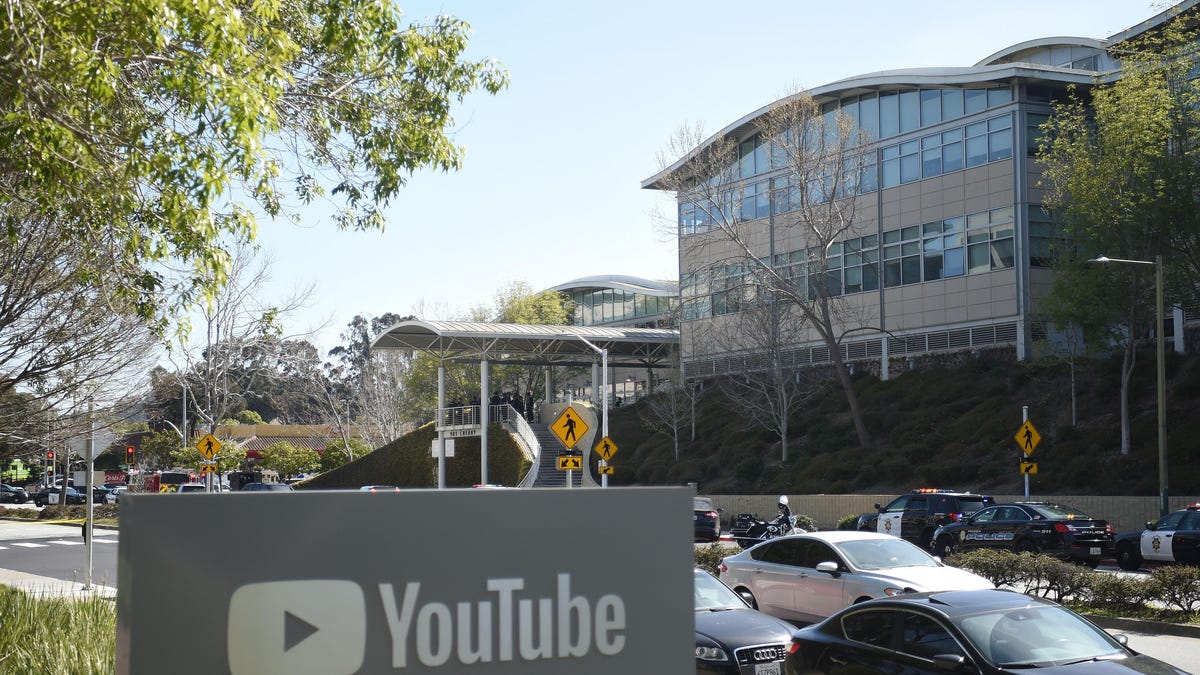How the YouTube tragedy turned into an internet mud fight
Commentary: When a shooter began firing in YouTube's San Bruno, California headquarters, many took to the internet to ask: which side is guilty?

When tragedy strikes, we see the best and worst of people through social media.
On Tuesday afternoon, a woman now identified as 39-year-old Nasim Aghdam went on a shooting spree in YouTube's San Bruno, California headquarters. Three people were injured and sent to local hospitals. Aghdam shot and killed herself.
The incident was over after a few hours, but now the second phase of tragedy begins. The internet brings us the good, the bad and the ugly.
The good? People send their thoughts and prayers out.
It's often said that prayers can't stop bullets, but there's good intent here. Apple CEO Tim Cook and Amazon CEO Jeff Bezos were among those who tweeted their support to YouTube and Google following the incident.
The ugly? The trolls everyone has come to expect.
As news of the shooting broke, a loud minority took to Twitter, Reddit and Facebook to share "scoops" on the shooter. Those accused of being the perpetrator? A BuzzFeed reporter, a YouTube personality, and, as has become a strange tradition, actor Sam Hyde. Why? For the lulz, most likely.
In the middle of these two groups is the bad. The "bad" aren't necessarily bad people, but their reactions sure do have negative effects. The bad are the ones who are all too eager to accuse someone on the other side as soon as something terrible happens.
"If this shooter at YouTube isn't a white male with far-right leanings, I will eat my f****** hat. Get rid of the f****** guns." That's what one (now deleted) tweet read, posted before the shooter was found to be a woman. It's since become widely mocked by people who are relieved the shooter was not, in fact, a white male with far-right leanings.
Aw, looks like he just ate his tweet, too. pic.twitter.com/nWYwkV7Y0b
— Michelle Malkin (@michellemalkin) April 4, 2018
Those in the US who want stricter gun control wanted desperately for the shooter to be a conservative nut with strong allegiance to the NRA. "Take that," they could say, "it was someone on YOUR team who did it."
One week ago, the NRA called on its members to "rise up" against YouTube. Today, there's a shooter at YouTube headquarters. pic.twitter.com/A23J3Ti49F
— Barney 🗽 (@barney1776) April 3, 2018
Slowly, information trickled out about the shooter. She's a vegan activist, and apparently Iranian. Suddenly, conservative voices rang out loud and proud. "Ha! She was on YOUR side all along."
Not a white male/female.
— Paul (@paulhd78) April 4, 2018
Not an NRA Member.
Not a Trump supporter.
Not a white supremacist.
Not a Christian.
An Iranian Muslim who was pissed off at YouTube.
The irony is DELICIOUS.
What say you, leftists? pic.twitter.com/wQOCcepPNb
alright liberals the #YouTube shooter was one of urs why yall so quite now man Hollywood went silent wjen it wasn't a white male, we need vegen animal rights activist control
— big mike (@bigmike899) April 4, 2018
This tendency is harmful on many fronts. It makes tragedy a team sport. Your team loses if someone who commits an atrocity is found to be on "your side." If, however, that person is on the other team, your team can use that as political leverage.
Once teams form around an atrocity, it encourages people to focus not on what's said in the aftermath, but who says it. The gun control debate will rage on with great ferocity in the coming days, but many are likely, as always, to focus on identities and not arguments.
Click for more Boom With a View.
You can almost feel it. It's just a matter of time before somebody, somewhere tries to argue that the shooter did her awful deed because she was a vegan activist. Not because she was a deranged person who happened to be a vegan activist. It sounds absurd and unlikely, but swap "vegan" with "Iranian" or "NRA-supporting white male" and it starts to sound familiar.
Most relevant to social media: All of the above creates an environment for fake news to thrive. Fake news, better defined as purposeful misinformation, is predominantly effective if you want to believe it.
In the hours following last October's Las Vegas massacre, the shooter who killed 59 people was believed to be far-left activist Geary Danley. There were enough people promoting this narrative, saying that someone on the other team was guilty, that even Facebook and Google's algorithms were duped. Except, he wasn't guilty at all. Stephen Paddock was.
I'm Australian. I have no horse in the gun control debate that is once again about to heat up. But polarized thinking is everywhere, and if we can get less excited about blaming tragedies on people we disagree with, it'll probably help.
iHate: CNET looks at how intolerance is taking over the internet.
Tech Enabled: CNET chronicles tech's role in providing new kinds of accessibility.

